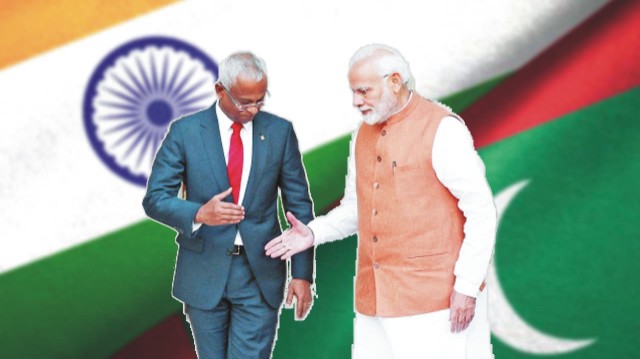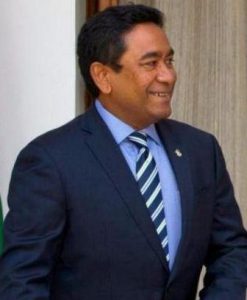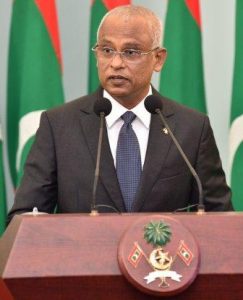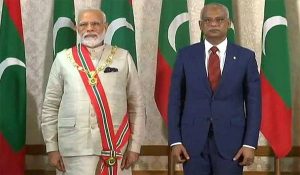

A lot has happened in the bilateral relations between India and Maldives during the last ten years. The relations which were once described as one of the most vibrant and dynamic, have turned into one in which India has been painted as a villain. Though the genesis started ten years back, yet it gathered further momentum during the last three years particularly, resulting in ‘India Out’ campaign on the social media.
The movement got a boost when the Maldives Supreme Court overruled former president Yameen’s conviction in a money-laundering and embezzlement case in November 2021. The development allowed him to make a return to politics.
A political campaign
Ties between India and the Maldives had hit a low during the tenure of Yameen, who was considered to be pro-China rather than pro-India. Yameen’s half-brother, former president and currently Maldives Reform Movement party leader (MRM) Mamoon Abdul Ghayum, is among those who have opposed the campaign, even in 2013 when Yameen became the president.

India-Maldives bilateral relations deteriorated during the Peoples Party of Maldives’ (PPM) five-year rule beginning in 2013, then led by Abdulla Yameen and the anti-India sentiment was apparent even back then, observers say.
Paradoxically though the Yameen government and its predecessor, the Waheed government, were considered “anti-India”, and though the Yameen government’s tilt in favour of China was clear, yet it had also openly discussed an ‘India-First’ policy for the Maldives.
Other political parties in the Maldives too have opposed the anti-India campaign, saying the former president is irresponsibly inciting hatred among the people towards India.
The PPM brushing aside the charges against it, in its defence says that the current Solih government has opted at times to keep the relationship, particularly that under the defence sector under wraps from where the criticism basically stems from.
The Adhaalath Party, a coalition partner of President Ibrahim Solih, in a statement condemned efforts to “incite hatred in the people’s hearts towards neighbouring and global partners”, and expressed concern at the “reckless acts led by former president Abdullah Yameen to incite hatred towards neighbouring India amongst the civilians”.
The Jumhooree Party, another coalition partner of the Solih government, also said in a statement that it doesn’t support any activities, which compromise the independence and sovereignty of the Maldives, and the Jumhooree Party does not believe that there is any legal ground to decide the existence of any Indian military presence in the country.
Out-India campaign
There are specific issues, which have fuelled the anti-India sentiments and rhetoric on the social media during the last three years. The first is the long-standing controversy over the two Advanced Light Helicopters (ALF) that were given by India to the Maldives in 2010 and in 2015, both of which were used for ocean search-and-rescue operations, maritime weather surveillance and for airlifting patients between islands.
These helicopters were meant to be deployed for humanitarian purposes only, but some in the anti-India constituency, particularly Yameen’s party PPM, tried to portray that by gifting these helicopters, India was creating military presence in the country because they were military choppers.
Secondly, the two countries signed bilateral agreements according to which Indian officers were to train the Maldives National Defence Force, under whose command these helicopters operate.

Thirdly, after the Solih government came to power, in 2019, local Maldivian media speculated that the UTF Harbour Project agreement signed between India and the Maldives in 2016, during the Yameen government, would be turned into an Indian naval base. Under the project India was to develop and maintain a coastguard harbour and dockyard at Uthuru Thilafalhu, a strategically located atoll near the capital Malé, and develop road connectivity to Male and decongest the Male harbour.
Back then, Maldivian chief of defence forces, Major-General Abdulla Shamaal had said that while the Indian government had indicated that it would provide grant assistance for this project, there were no plans of any Indian naval base in the country. Fourthly, in 2016, an Action Plan between India and the Maldives was signed for ‘defence cooperation’ to enhance “shared strategic and security interests of the two countries in the Indian Ocean region”.
In 2016 when anti-India sentiments were at their peak and the bilateral relations were at their worst against the perceived military presence of Indian forces in Maldives, the Yameen government had asked India to take back these helicopters and refused to extend the term of the agreement that would extend their stay and use in the country.

During the Yameen-era, India had looked on in concern as the Maldives began to develop stronger ties with China and its Belt and Road Initiative.
By 2018 when Ibrahim Mohamed Solih assumed office, he immediately renegotiated these agreements, extending the stay and use of these choppers in the country. The Solih government’s visibly warm relations with India have only served to fuel anti-India sentiment in the country.
However, among the many grievances in social media posts by prominent members of ‘India Out’ campaign, a recurring complaint is the lack of transparency in agreements being signed between the Solih government and India.
It is a fact that that much of the criticism levelled by the Maldivian opposition and the ‘India Out’ campaign wouldn’t have arisen had these bilateral agreements been publicly discussed in the Maldivian Parliament. But the ruling government and the defence ministry describing these agreements as confidential has led to agitation in political circles that percolated down to ordinary Maldivian nationals and has taken the form of a wave of criticism, inflammatory rhetoric and unverified allegations, especially on social media platforms.
Fundamentally, the issue is not so complex though it involves bilateral relations, geopolitical and economic interests for both countries. However, both the governments have acted in a mature manner in this regard. Both of them are aware of the increasing defence importance of Maldives in the Indian Ocean, due to the increased US interest in the Indo-Pacific and Maldives’ strategic position. In addition to the Maldivian need to have India on its side to guard its defence and commercial interests. ![]()
_____________
Also Read:
Centre’s Opaque Auction Rules For Pulses Rip Off Govt Coffers, Help Millers Strike Rich
Need to amend laws like UAPA to provide for punishment for those who slap false cases
Global Arms Trade: Who are the real winners?
Why not 40 pc tickets for women in Punjab and elsewhere?
Punjab – How a deadly cocktail of Agri-Water-Energy nexus going to destroy it?
North Pole and the ideological conflict of RSS & Hindutva
Politics of Symbolism: Dalit Chief Ministers in India

Disclaimer : PunjabTodayTV.com and other platforms of the Punjab Today group strive to include views and opinions from across the entire spectrum, but by no means do we agree with everything we publish. Our efforts and editorial choices consistently underscore our authors’ right to the freedom of speech. However, it should be clear to all readers that individual authors are responsible for the information, ideas or opinions in their articles, and very often, these do not reflect the views of PunjabTodayTV.com or other platforms of the group. Punjab Today does not assume any responsibility or liability for the views of authors whose work appears here.
Punjab Today believes in serious, engaging, narrative journalism at a time when mainstream media houses seem to have given up on long-form writing and news television has blurred or altogether erased the lines between news and slapstick entertainment. We at Punjab Today believe that readers such as yourself appreciate cerebral journalism, and would like you to hold us against the best international industry standards. Brickbats are welcome even more than bouquets, though an occasional pat on the back is always encouraging. Good journalism can be a lifeline in these uncertain times worldwide. You can support us in myriad ways. To begin with, by spreading word about us and forwarding this reportage. Stay engaged.
— Team PT


Copyright © Punjab Today TV : All right Reserve 2016 - 2025 |